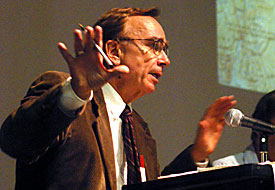 |
|
DANIELLE MALOTT/Arizona Daily Wildcat
|
Richard Eaton a UA professor of history addresses the historical context of looting and destruction of cultural objects at last night's discussion on the situation in Iraq. The talk was hosted by the center for Middle Eastern Studies.
|
|
|
By Nathan Tafoya
Arizona Daily Wildcat
Wednesday September 10, 2003
Two days after President Bush asked Congress for $87 billion for the reconstruction of Iraq, a group of panelists spoke to a crowd of 150 people about the obstacles facing the U.S. effort in the war-torn country.
The panel, entitled, "Iraq: Reflections and Reactions," was hosted by the Center for Middle Eastern Studies, one of 15 U.S. resource centers devoted to the study of the Middle East. Keynote panelists included a former ambassador to Oman, and professors from UA, Berkeley and the University of Beirut Departments of Political Studies and Public Administration.
Anne Betteridge, director for the Center for Middle Eastern Studies, said the
purpose of the forum was to present information about Iraq from a variety of fields of expertise and to facilitate public discussion.
"We feel we have a responsibility to share information about the Middle East to the public," Betteridge said, adding that it was appropriate to do something before tomorrow arrives, which is the second anniversary of the attacks on the World Trade Centers in New York.
The first half of the forum concentrated on the Iraqi cultural ramifications of looting following the U.S. invasion and subsequent occupation. Anne Kilmer, Professor Emerita at the University of California, Berkeley, stated that approximately 13,000 Iraqi artifacts have been looted from museums and sold on the antiquity black market.
"It's restoration has become a world-wide concern," she said of the National Museum in Baghdad.
Richard Eaton, a UA history professor, gave a historical context for the plundering. Since the Persian Gulf War, organization and a systematic pattern of looting has been established.
 |
Now we've got to try to put (Iraq) back together.
- David Dunford
former U.S. ambassador to Oman and senior coalition provisional authority representative to Iraqi Foreign Ministry
|
 |
Former U.S. ambassador to Oman, David Dunford, and visiting professor Ahmad Moussalli, focused on the political climate of Iraq.
"The popular public opinion was against invasion and today, against occupation of Iraq," Moussalli said, explaining the Arab reaction to the liberation of Iraq.
"Regardless of what you thought about the decision to remove Saddam from power ÷ it's done. It's history," said Dunford, who was the Senior Coalition Provisional Authority Representative to the Iraqi Foreign Ministry from April to June. "Now we've got to try to put (Iraq) back together."
Both Dunford and Moussalli expressed that the U.S. needs to work with other countries to reconstruct Iraq.
"We need all the help we can get," said Dunford.
He said the U.S. should turn to the U.N. to help shoulder the cost of rebuilding Iraq and for military assistance.
"The U.S. does not understand Iraq very well," Moussalli said. "They need the support of others."
Dunford said the U.S. was not prepared for the high expectations Iraqis had when the war ended. He also said the U.S. could not meet their expectations in a timely manner.
"The U.S. occupation of Iraq destroyed the state. It did not just destroy Saddam's regime," Moussalli said.
When asked about the $87 million President Bush requested of Congress for rebuilding Iraq, Dunford said he was happy about Bush's initiative.
"One of our problems is that we are trying to do it on the cheap," he said. "I'm pleased the president is willing to spend real money on reconstructing Iraq."
Jessica Denisi, a Near Eastern Studies graduate student, said she found the forum informative.
"I enjoyed it, she said. "It's too bad more people don't come."
